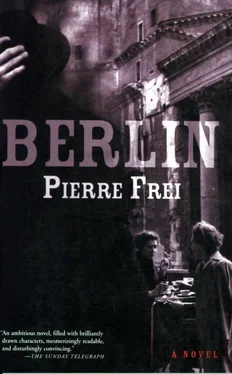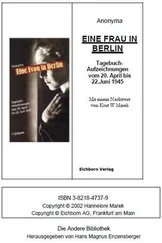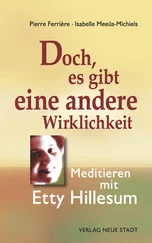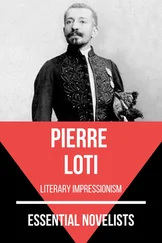'Somewhere in the park with his new flame.' Funny, but the thought of Miriam suddenly doesn't bother her. 'Do you always come calling by plane?'
He grins. 'Not on the Kurfiirstendamm. The overhead tram cables would get in the way. Have you ever flown?'
'Not yet.'
'We'll take a little trip tomorrow.' He doesn't ask if she wants to, this astonishing man, he just decides. She imagines flying through the air, pressing close to him in alarm, an unrealistic thought since the two open seats in the Klemm 25 are arranged one behind the other, but it's nice all the same. Even the hope of a ride with Hans-Georg pales in comparison.
They have all changed for the evening. The Baron wears a starched shirtfront with a wing collar under his dinner jacket. Hans-Georg looks fantastic in his white uniform jacket, but Detta has eyes only for her airman. He appears at the top of the stairs, looking round for help. 'Could someone please tie my bow tie for me?'
'Come down, Herr Glaser, and I'll do it,' calls Detta eagerly.
'If you call me Herr Glaser again I shall use Henriette for you,' he threatens her, smiling. 'I'm Tom to my friends.'
The Harsteins from the neighbouring estate have come to dinner, the local clergyman Pastor Wunsig and his wife, the veterinarian and his wife. And a certain Herr Fanselow, the district farmers' leader. A kind of Party agricultural official,' the Baron surmises. 'He could help us finance the new stud farm. That would be a good contribution to National Socialism — or in this case local Socialism.' The Baron is prepared to move with the times.
Wearing boots to dinner? Detta doesn't take to Fanselow at all.
It turns out that the man used to be a shoe salesman at Leiser's in Berlin. The Party has given him his lucrative position as a functionary in the country because of his record as a 'meritorious old campaigner', someone who backed the National Socialists from their early days. He hasn't the faintest idea about farming or stock breeding, but he lards his conversation with jargon about 'blood and the soil', 'sound Reich husbandry' and 'iron ploughshares'. Detta thinks it all rather silly.
'Have you seen the plans for our stud farm yet?' Father steers the conversation straight to the subject on his mind. A project intended to benefit all the farms in the area. With your Party's support it could be up and running in half the time.'
Fanselow dismisses the idea. 'Later, Baron. First we must cleanse the new Germany of Jewish bloodsuckers and parasites. Take our own district here. Two Jewish doctors, a Jewish dentist, a Jewish notary. And the architect of the stud farm you're planning is called GrUnspan. They'll all have to go.'
'Oh, and will our friend here have to go too? Or when you were introduced did you conveniently overlook the fact that Fraulein Miriam's surname is Goldberg?' Hans-Georg asks sharply.
Bensing brings in a platter of crayfish. 'We mustn't let the last month without an R in it go by uncelebrated,' says the Baroness, smiling as she changes the subject. 'Will you do the honours, Pastor?'
Wunsig says grace, his voice loud and clear. All but Fanselow bend their heads. 'I suppose,' Detta challenges him, that as a Local Socialist you don't believe in God?'
'National Socialist,' Fanselow corrects her, and announces grandly: 'I believe in the German spirit as it manifests itself at this historic time and place.'
'My plaice had an awful lot of bones in it last Friday,' says Detta innocently, earning herself an amused look from the airman and a glance of annoyance from the champion of good Reich husbandry, who is waiting for someone else to tackle the crayfish first. He's never eaten them before, Detta realizes.
'Do you like crayfish, Herr Fanselow?' Detta pushes her plate aside and spreads her napkin on the table in front of her with a business-like air. She holds her soup spoon in her left hand. With her right hand, she picks up a crayfish by driving her fork into its soft part. Fanselow does the same. She ceremoniously transfers the shellfish from the platter to her spoon. Fanselow follows her example. Then she puts down her fork and takes the crayfish from her spoon with the serving tongs. She drops it from chest height to her napkin.
'Here, Herr Fanselow.' She politely hands him the serving tongs. The others are watching this performance, spellbound. Miriam is grinning to herself. Detta carefully folds all four corners of her napkin over the crayfish and brings her fist down on it a couple of times. Fanselow copies her. Detta unfolds the corners of the napkin. 'Delicious,' she murmurs. Fanselow opens his own napkin and looks rather doubtfully at the smashed crayfish inside. Then he begins poking about in the ruins with his fork.
Detta tips her work of destruction off the napkin and into the dish standing ready for the shells, lifts a couple of fresh crayfish to her plate with the tongs, and skilfully takes them apart with her fingers, one by one. 'Enjoying your crayfish?' she asks her neighbour with a sweet smile.
'That was very naughty of you,' her mother reprimands her after dinner, when the gentlemen have adjourned to the library for cognac and cigars.
'The man's a commoner and an anti-Semitist,' Detta says, her tongue tripping over the word.
'Well, yes, he is certainly an anti-Semite,' her mother corrects her. 'Heaven knows what he and his kind have in store for us. All the same, he is our guest.'
Miriam has brought some gramophone records from Berlin. Jack Hylton and His Orchestra. 'They play on the "Eden" roof garden. Fabulous, really fabulous.'
'Negro music,' grumbles Fanselow. Anything so alien to our race should be banned.'
Miriam dances exuberantly with Hans-Georg. She knows the latest steps of the shimmy. Detta isn't at all jealous of her any more. After all, she has her airman now. In high spirits, she tries out the wild contortions of the dance with him. But best of all is resting in his arms as they dance a slow foxtrot. She's never been so close to a man before. Except for Hans-Georg, but of course that's quite different.
'Wednesday, 1 August '34. Fabulous airman lands here. He's a friend of Hans-Georg, his name is Thomas Glaser but he asked me to call him Tom. A few guests to dinner. A Herr Fanselow, no idea how to eat crayfish. If he'd been nice I'd have shown him, tactfully, how to do it. But he was a horrible man and said nasty things about Herr Gri nspan, and how all the Jews would have to go. I suppose he meant Miriam too. Hans-Georg put him in his place, and I made him look a fool over the crayfish. Well, he deserved it.
Thursday, 2 Aug. '34. 1 borrow Vati's driving cap and his big owl goggles. Everyone's gathered on the lawn behind the house. The estate workers and their families are gaping at the aeroplane. Tom shows HansGeorg how you start the propeller turning. I climb up on the left wing and squeeze into the front seat. Tom gets in behind me. I hope he can see well enough.
The engine coughs wearily a couple of times, but then thinks better of it and starts. We bump across the lawn, the trees are coming closer uncomfortably fast. Then they're below us. We're flying!!!
Aichborn quickly gets smaller. People wave. I turn round. Tom smiles at me. Life's so wonderful! The engine roars. Suddenly the ground is above me, and so is my stomach. I discover later that it's called looping the loop.
Phew — my stomach and the ground are back in their proper places. I take a deep breath. After a quarter of an hour we drop straight down, it's like being in a lift. Tom catches his aircraft up just above the ground and brings it down safely on the lawn. Everyone applauds. I climb out and try jumping elegantly off the wing, but my knees are soft as butter. Luckily Hans-Georg catches me.
Another adventure in the afternoon. Miriam lets me drive her fabulous car. Jeschke taught me to drive a tractor a couple of years ago, and it's not so very different, except that the roadster is considerably faster and has good brakes, which are useful when a haycart unexpectedly crosses the road. People around here aren't expecting fast, white sports cars, only Dr Kluge's old Opel…'
Читать дальше












